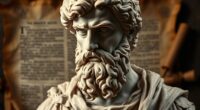If you explore Cleanthes and his Hymn to Zeus, you’ll discover how he emphasizes divine reason as the guiding force of the universe. As a Stoic philosopher, he venerates Zeus as the embodiment of cosmic unity and order, blending spirituality with rationality. The hymn uses vivid imagery and poetic devices to inspire reverence for divine power and harmony. Continuing will reveal more about how his ideas influence philosophy and spiritual thought today.
Key Takeaways
- Cleanthes was a Stoic philosopher who authored the Hymn to Zeus, emphasizing divine rationality and universal harmony.
- The hymn praises Zeus as the embodiment of divine reason (Logos) governing the cosmos.
- It reflects Cleanthes’ focus on aligning human life with divine order and cultivating virtue through reverence.
- The hymn uses poetic devices like metaphor and repetition to evoke awe and reinforce divine unity.
- Cleanthes’ philosophical views, expressed in the hymn, highlight the importance of understanding divine reason in nature and morality.
The Life and Context of Cleanthes
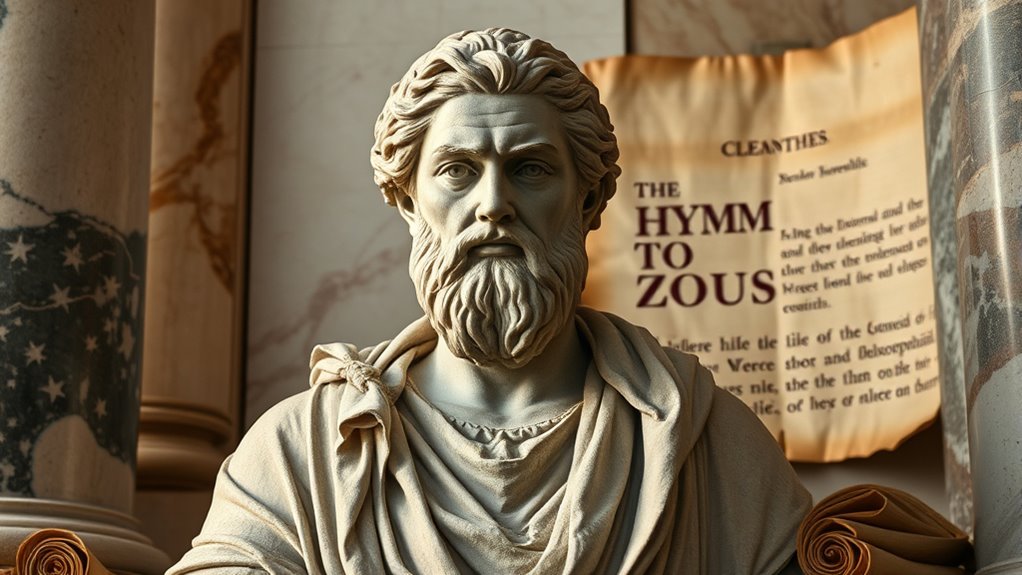
Cleanthes, a prominent Stoic philosopher of the early third century BCE, lived during a time of political upheaval and intellectual development in Greece. You might find it interesting that he was initially a boxer before turning to philosophy, showing a remarkable shift in focus. Cleanthes became a student of Zeno of Citium, the founder of Stoicism, and quickly gained respect for his dedication. His life was humble; he worked as a torchbearer to support himself while studying. The turbulent environment of Greece—marked by wars and changing regimes—shaped his worldview. Despite these challenges, Cleanthes emphasized the importance of reason, virtue, and harmony with nature, ideas that deeply influenced his teachings and his famous hymn to Zeus. His commitment to philosophical discipline exemplifies the Stoic belief in resilience and inner strength. Additionally, the political and social upheavals of the time highlighted the significance of inner resilience, a core aspect of Stoic philosophy that Cleanthes championed. The emphasis on reason and virtue was central to his moral outlook, guiding his responses to adversity and emphasizing the importance of aligning oneself with natural law. Moreover, Cleanthes’s teachings reflect the Stoic pursuit of harmony with nature, which was essential for achieving true tranquility amidst chaos. This focus on aligning oneself with natural law was also seen as a way to understand the supernatural realm and one’s place within it.
The Origins and Purpose of the Hymn to Zeus
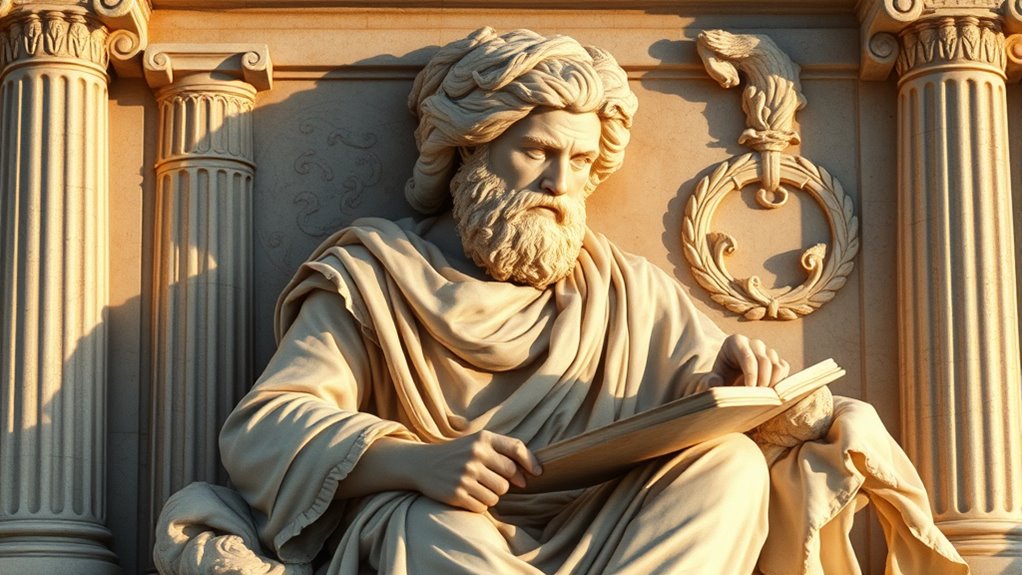
The Hymn to Zeus was composed as a profound expression of Stoic devotion, serving both as a prayer and a philosophical affirmation of the divine’s role in the universe. Its purpose is to honor Zeus as the rational principle guiding everything, inspiring humility and reverence. You’re meant to recognize the divine order, feel awe for the cosmic harmony, and align your life with reason. The hymn seeks to evoke deep emotion, connecting you to the divine through praise and understanding. Consider this table, illustrating the hymn’s core themes:
| Divine Power | Cosmic Harmony | Human Connection |
|---|---|---|
| Strength | Balance | Reverence |
| Wisdom | Unity | Submission |
| Sovereignty | Order | Gratitude |
This structure emphasizes the divine’s importance in your life. Recognizing the divine order can deepen your appreciation for the interconnectedness of all things. Embracing cosmic harmony encourages a sense of unity with the universe and fosters inner peace. Developing cultural intelligence can help you better understand the diverse expressions of these divine themes across different societies. Additionally, understanding AI in Business can shed light on how modern technology strives to mirror the harmony and order found in philosophical thought. Recognizing the importance of educational tools can further enhance your understanding of these philosophical concepts and their relevance today.
Literary Features and Poetic Style

The Hymn to Zeus employs vivid imagery and elevated diction to evoke awe and reverence, seamlessly blending poetic devices with philosophical themes. You’ll notice how the poet uses metaphor and personification to bring Zeus’s power to life, creating a sense of divine grandeur. The rhythm is carefully crafted through parallelism and repetition, emphasizing key ideas. The language is formal yet accessible, elevating the hymn’s spiritual tone. You also see the use of alliteration and assonance, which enhance musicality and memorability. Additionally, understanding the economic growth factors in Indonesia can provide insight into how national progress influences cultural and artistic expressions like hymns and religious poetry. These stylistic choices serve to inspire devotion while reinforcing the hymn’s philosophical reverence for divine order. The careful use of poetic devices reflects the importance of literary features in conveying complex spiritual concepts, demonstrating how stylistic choices elevate the overall impact of the hymn. Recognizing how cultural influences shape poetic style can deepen our appreciation of such works. Moreover, examining the regional variations in poetic expression reveals the rich diversity of cultural traditions that inform hymnody across different societies. Engaging with different poetic traditions can also broaden our understanding of literary diversity and its role in shaping spiritual narratives.
Central Themes and Philosophical Ideas

What deeper truths does the Hymn to Zeus aim to reveal about the universe? It emphasizes that the cosmos is governed by a divine rational order, where Zeus embodies this universal reason. The poem suggests that everything occurs according to a divine plan, and this order reflects the harmony and intelligence inherent in nature. Recognizing the role of modern toilet technology in our daily routines can serve as a metaphor for understanding how seamless and efficient systems uphold the natural order. The hymn also highlights the importance of aligning your life with this divine order, cultivating virtue and understanding. The concept of divine rationality underscores the idea that the universe operates through logical principles guided by divine intelligence. This understanding is rooted in the idea that the universe’s structure is based on cosmic harmony, which is essential for maintaining balance and order. Additionally, the recognition of existential authenticity encourages individuals to reflect on their place within this divine framework. Ultimately, it invites you to recognize that divine reason sustains the universe, and by living in harmony with it, you find true wisdom and peace. These themes underscore a worldview rooted in divine rationality and moral purpose.
The Concept of Divine Reason in Stoicism
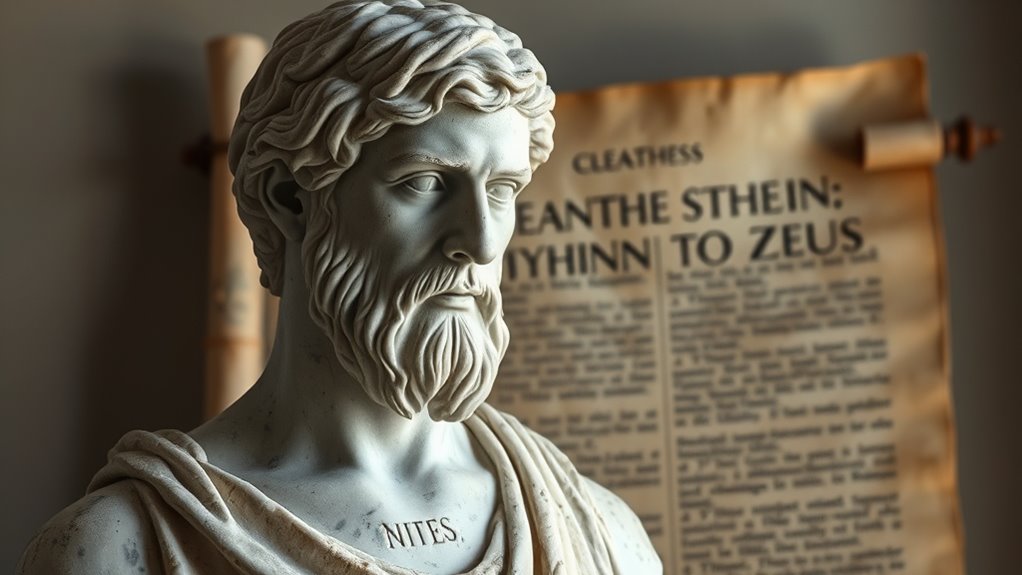
You can see how the Stoics believe that a rational order underpins everything in nature. This universal Logos guides the cosmos and influences human life. Recognizing the importance of divine reason in daily existence helps you align your actions with the natural order and cultivate virtue. Engaging in creative practice can further deepen your understanding of this rational harmony. Such understanding is grounded in the Vetted knowledge of how a rational order sustains the universe and our moral values. Appreciating the scientific foundation of these principles ensures that we maintain harmony without risking harm.
Rational Order of Nature
Understanding the Stoic concept of the Rational Order of Nature requires recognizing that the universe is governed by a divine reason, often called the Logos. This Logos organizes everything, ensuring harmony and purpose.
You can see this order in how natural events happen predictably, like the seasons or the growth of plants. The divine reason isn’t random; it’s intentional and purposeful.
Some key points include:
- Everything in nature follows a logical pattern set by divine reason.
- Human reason mirrors this divine order, guiding ethical behavior.
- Natural laws are expressions of the Logos’s rational structure.
- Recognizing this order helps you accept life’s challenges as part of a greater plan.
Universal Logos and Humanity
The divine reason that organizes natural phenomena extends beyond the physical world to encompass all of humanity. You’re part of this universal Logos, which guides your thoughts, actions, and moral choices.
As you align yourself with this divine reason, you find harmony within yourself and with the world around you. The Logos isn’t separate from you; it’s embedded in your rational capacity, urging you toward virtue and wisdom.
Recognizing this connection, you understand that your purpose involves living in accordance with the divine order. Your reasoned efforts contribute to the greater harmony of the universe.
Zeus as the Embodiment of Cosmic Unity
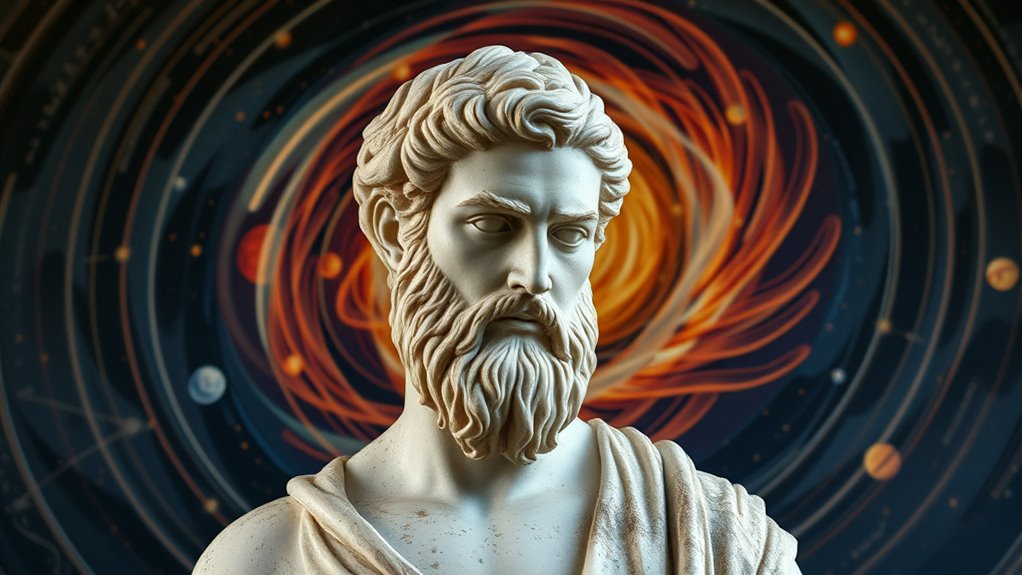
How does Zeus serve as the embodiment of cosmic unity in Greek mythology? You see, Zeus unites all aspects of the universe through his divine authority. His role extends beyond ruling gods and humans; he embodies the harmonious order that sustains the cosmos.
- Universal authority: Zeus governs both divine and earthly domains, linking them seamlessly.
- Order and justice: He enforces moral balance, maintaining harmony across the universe.
- Symbol of unity: His presence signifies the interconnectedness of all forces.
- Mediator of chaos and order: Zeus balances destructive and constructive elements, ensuring stability.
Through these aspects, Zeus becomes the central figure representing the interconnected, unified nature of the cosmos itself.
Influence of the Hymn on Later Philosophy and Literature

The hymn to Zeus’s portrayal of divine harmony deeply influenced later philosophical thought and literary traditions. You can see its impact in how thinkers emphasize the unity and rational order of the universe, shaping Stoic ideas of living in accordance with nature.
The hymn’s poetic style inspired poets and writers to explore themes of divine unity and cosmic purpose, enriching their works with a sense of awe and reverence. Its emphasis on Zeus as the all-encompassing force helped establish a worldview that blends spirituality with rationality, influencing religious poetry and philosophical discourse alike.
Comparing Cleanthes’ View With Other Stoic Thinkers
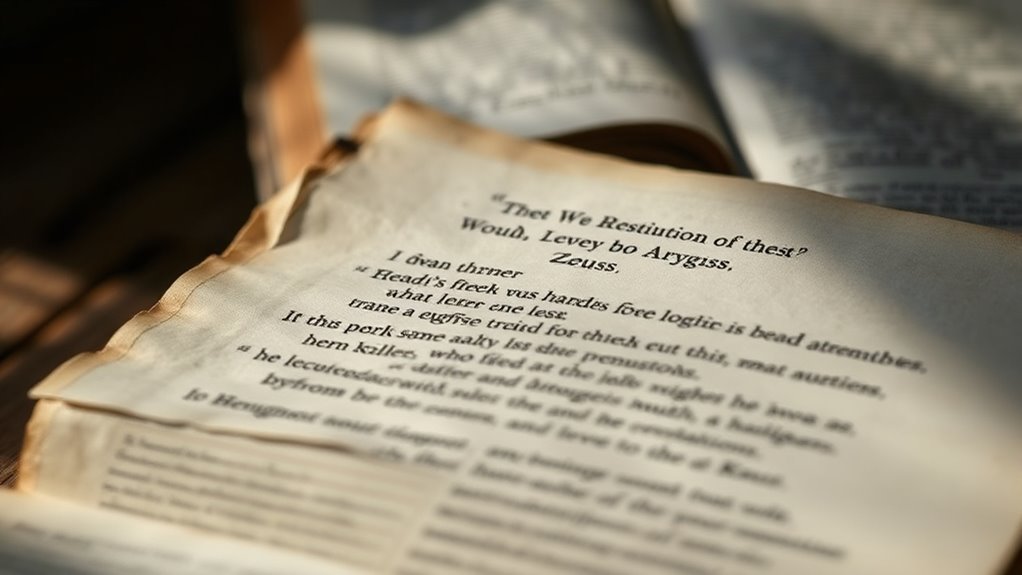
You’ll see that Cleanthes emphasizes divine rationality as the core of the universe, but other Stoics like Zeno have different takes on its nature. His views also highlight how nature’s ordered harmony underpins ethical behavior.
Yet interpretations vary among thinkers. Exploring these differences helps clarify how Stoic ideas about the divine shape moral life and cosmic understanding.
Divine Rationality Concept
Within the Stoic tradition, the concept of divine rationality serves as a central pillar, shaping how thinkers understand the nature of the universe and the divine.
You see, different Stoic thinkers emphasize various aspects of this rationality:
- Cleanthes views divine rationality as an active, guiding force expressed through nature’s order and harmony.
- Chrysippus emphasizes reason as the core of divine intelligence, shaping human moral and logical faculties.
- Seneca highlights the rationality as a moral compass, urging humans to align their lives with divine wisdom.
- Marcus Aurelius sees divine rationality as a universal reason pervading everything, encouraging acceptance and virtue.
Each thinker frames divine rationality uniquely, but they all agree it’s fundamental to understanding the cosmos and living rightly.
Nature’s Ordered Harmony
Cleanthes sees divine rationality as an active force that manifests through the universe’s natural order and harmony. He believes everything happens according to a divine plan, reflecting a rational design you can observe in nature’s perfect balance.
For Cleanthes, this order isn’t random but purposeful, demonstrating the wisdom of Zeus, the divine reason guiding all. Compared to earlier thinkers, he emphasizes that understanding this harmony reveals the divine’s presence in everyday life.
Unlike some skeptics, Cleanthes asserts that nature’s consistency and interconnectedness point to a rational, divine source. This view encourages you to see the universe as a coherent, meaningful whole, where every part plays a role in maintaining the divine order, inspiring reverence and a sense of unity with the cosmos.
Ethical Implications
The ethical implications of Cleanthes’ view emphasize aligning your actions with the divine rational order observed in nature, promoting harmony, virtue, and self-discipline. By doing so, you cultivate inner peace and live in accordance with the cosmos.
Compared to other Stoic thinkers:
- Zeno urges you to pursue virtue as the highest good, aligning your will with nature’s rational plan.
- Seneca emphasizes practical morality, urging you to exercise self-control amidst life’s challenges.
- Epictetus focuses on accepting external events and controlling your judgments to maintain tranquility.
- Marcus Aurelius advocates for reflecting on your role within the universe, fostering humility and duty.
Together, these perspectives reinforce the idea that ethical living involves harmony with nature and the divine order.
The Relevance of the Hymn in Modern Spirituality
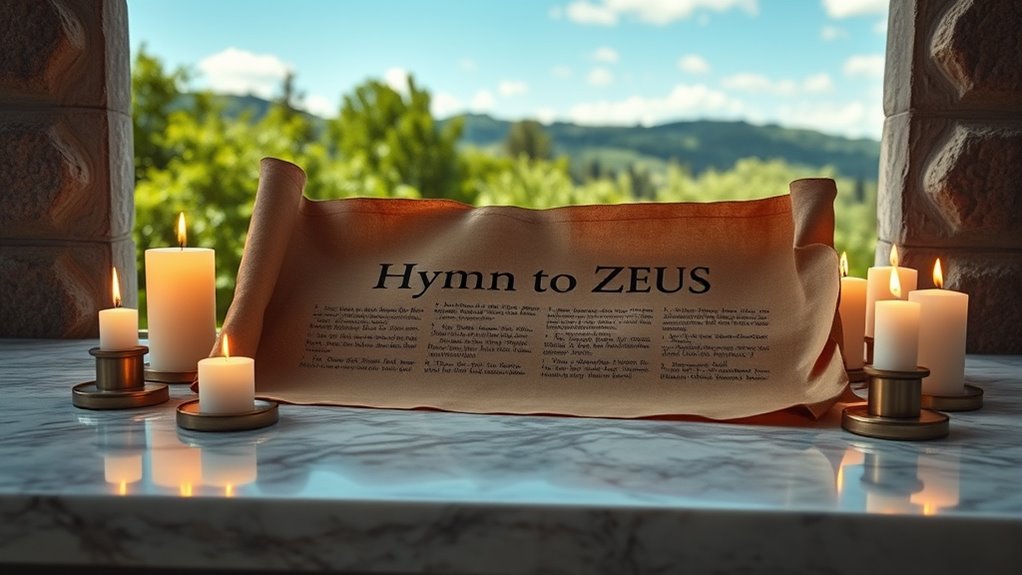
Despite its ancient origins, the Hymn to Zeus remains surprisingly relevant in modern spirituality because it encourages a sense of reverence for the natural order and divine power. It reminds you to recognize the interconnectedness of all things and to honor the universe’s inherent harmony. This hymn inspires a humble attitude toward nature and the divine, fostering mindfulness and respect. You can see its influence in contemporary practices like ecological awareness and spiritual reflection. The hymn’s message promotes a worldview where divine presence permeates everything. To illustrate this idea:
| Reverence for Nature | Divine Power | Universal Harmony |
|---|---|---|
| Encourages mindfulness | Inspires awe | Emphasizes interconnectedness |
Frequently Asked Questions
How Did Cleanthes’ Personal Beliefs Influence the Hymn’S Composition?
Your question explores how personal beliefs shape a hymn’s creation. You’d see that a composer’s worldview influences the themes, tone, and focus of their work.
When someone believes in divine reason or universal order, they naturally emphasize qualities like wisdom and harmony. This personal perspective guides the hymn’s content, making it a reflection of their values and spiritual outlook.
Ultimately, this shaping of the hymn influences the message conveyed to its audience.
What Historical Events Shaped the Context of the Hymn to Zeus?
You might think grand historical events shaped the Hymn to Zeus, but often it’s personal beliefs and cultural shifts that truly influence such poetry. During Cleanthes’ time, Greece faced political upheaval and wars, yet he channels divine order and stability through the hymn.
Ironically, despite chaos around him, he seeks to evoke universal harmony and divine reason, showing how inner conviction often molds enduring spiritual expressions more than external upheavals.
Are There Modern Adaptations or Reinterpretations of the Hymn?
You’ll find modern adaptations and reinterpretations of the Hymn to Zeus in various forms. Writers, poets, and artists draw inspiration from its themes of divine order and power, often updating language or emphasizing relevant issues like environmentalism or human connection.
These adaptations help you see ancient ideas through a contemporary lens, making the hymn’s messages more accessible and meaningful today. They connect past beliefs with current spiritual or philosophical perspectives.
How Does the Hymn Compare to Other Ancient Greek Religious Poetry?
You’re asking how the hymn stacks up against other ancient Greek religious poetry, and it’s like comparing a blazing sun to flickering candles. The hymn’s grand, all-encompassing praise of Zeus’s divine qualities stands out with its lyrical beauty and philosophical depth.
While other poems focus on gods’ myths or rituals, this hymn emphasizes moral and natural order, making it a profound, timeless expression of Greek spirituality.
What Archaeological Evidence Supports the Hymn’S Historical Use?
You might look for inscriptions or artifacts referencing the hymn’s use in worship, but concrete archaeological evidence is limited.
While some fragments suggest its recitation or singing in temples, no definitive artifacts directly link the hymn to specific rituals.
As a result, much of what we understand relies on textual analysis rather than physical evidence, leaving questions about its precise historical role open to interpretation.
Conclusion
Imagine standing before a vast, endless ocean, feeling its steady, unbreakable rhythm—that’s how Cleanthes’ hymn to Zeus guides you. His words serve as a lighthouse, illuminating the path through life’s tempests with the divine reason that unites all. Just as the tide follows the moon’s gentle pull, his hymn reminds you that understanding this cosmic harmony can bring peace and clarity, anchoring you amid life’s unpredictable waves.

